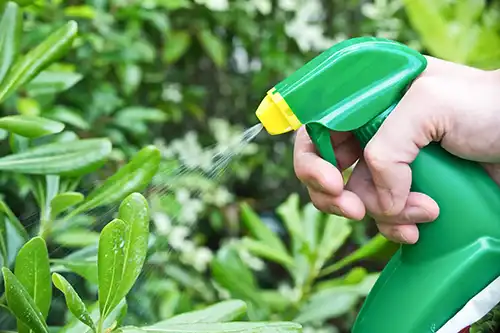Using insecticides shortly after overseeding is not recommended, particularly when there are no existing pest concerns. The chemicals can harm young seedlings, which are sensitive and unable to handle such treatments. Instead, wait until the grass is established before considering pest control, allowing the seedlings to mature and thrive.

How Long Should I Wait After Overseeding to Use Insecticide?
To get the best results, it’s important to wait until your grass is completely mature before applying any chemical solutions like insecticides or herbicides. This typically means waiting two to four weeks, giving the grass time to grow stronger and more resilient to environmental changes.
Need Lawn Care? We Can Help.
Click the button below to leave your information & we'll be in touch in an hour or less.
Leave your information below and we’ll be in touch with a FREE quote!
"*" indicates required fields
*During normal business hours. After hours calls will be returned the next business day.
Can New Grass Seed Attract Pests?
Grass seeds that have just been planted can sometimes lure pests like mice to your yard, as the seeds provide an easy meal, particularly in the first few days. However, as the grass starts to grow, pests are more likely to move elsewhere. So, if pests aren’t already a problem, overseeding shouldn’t cause any concerns. Some natural methods to deter pests while overseeding include:
- Reducing Debris and Clutter: Items like tall grass, piles of leaves, and outdoor furniture can create ideal hiding places for pests. Regularly clearing away unnecessary clutter helps make your yard less inviting to these creatures.
- Avoid Overwatering: Overwatering can attract pests, much like poor drainage. If you notice soggy spots or overly damp areas, reduce your watering schedule to avoid creating a habitat for pests.
- Improving Drainage: Wet conditions are favorable for pests such as insects, rodents, and fungi. If your lawn suffers from poor drainage or water buildup, such as from clogged gutters or compacted soil, you’re more likely to face pest problems.
Should I Overseed My Lawn If I Have Pests?
It’s important to handle any pest issues before overseeding your lawn. You want to avoid attracting more pests or damaging the new grass sprouts. Pests can quickly undermine the health of your lawn, making it harder for the grass to establish itself. Make pest control your first step, and once the problem is resolved, overseeding will help rejuvenate your lawn by filling in bare spots and encouraging stronger, healthier growth.
Professional Lawn Pest Prevention
Looking to protect your lawn from pests and promote healthy growth? Let the experts at Bug Out help! Our professional lawn care services provide effective solutions for a pest-free, vibrant landscape. With our experienced technicians and top-tier practices, we eliminate common lawn pests like grub worms, ants, moles, and more. We tailor our services to fit your specific needs, offering everything from overseeding and fertilization to pest control.
